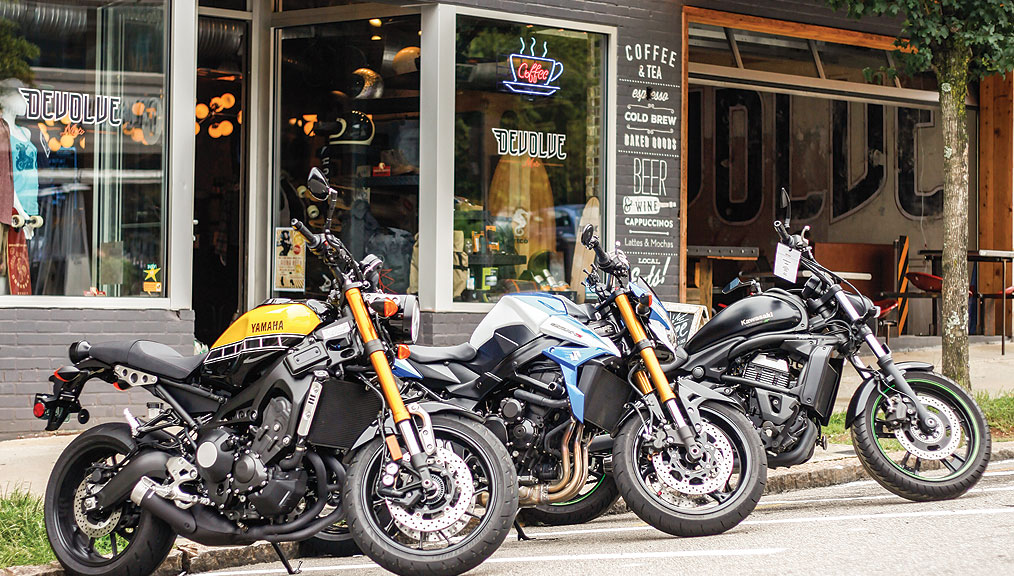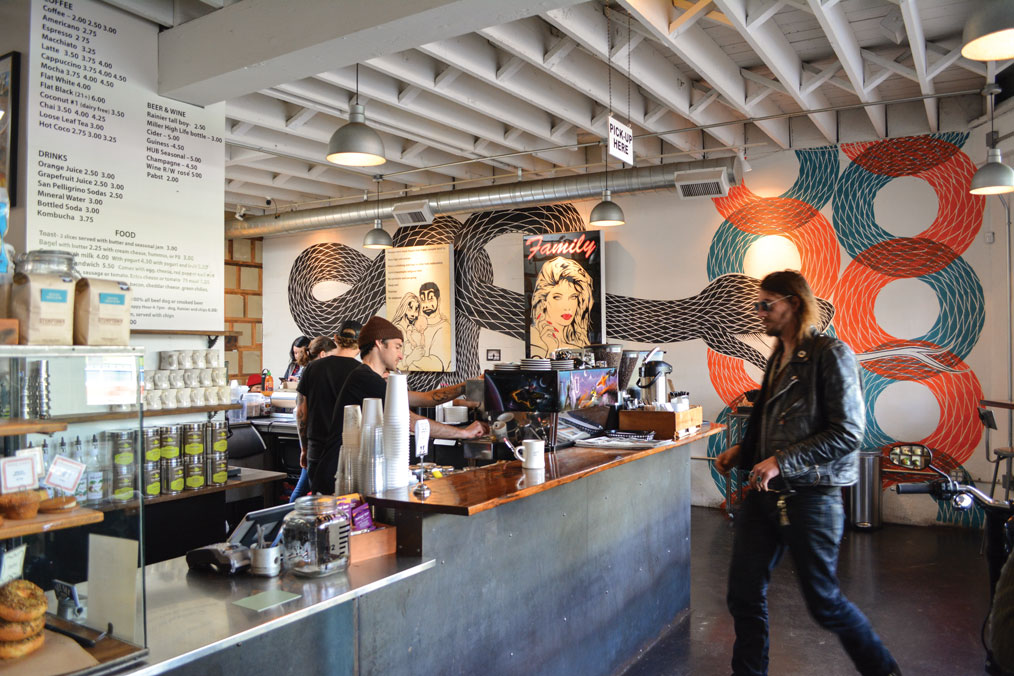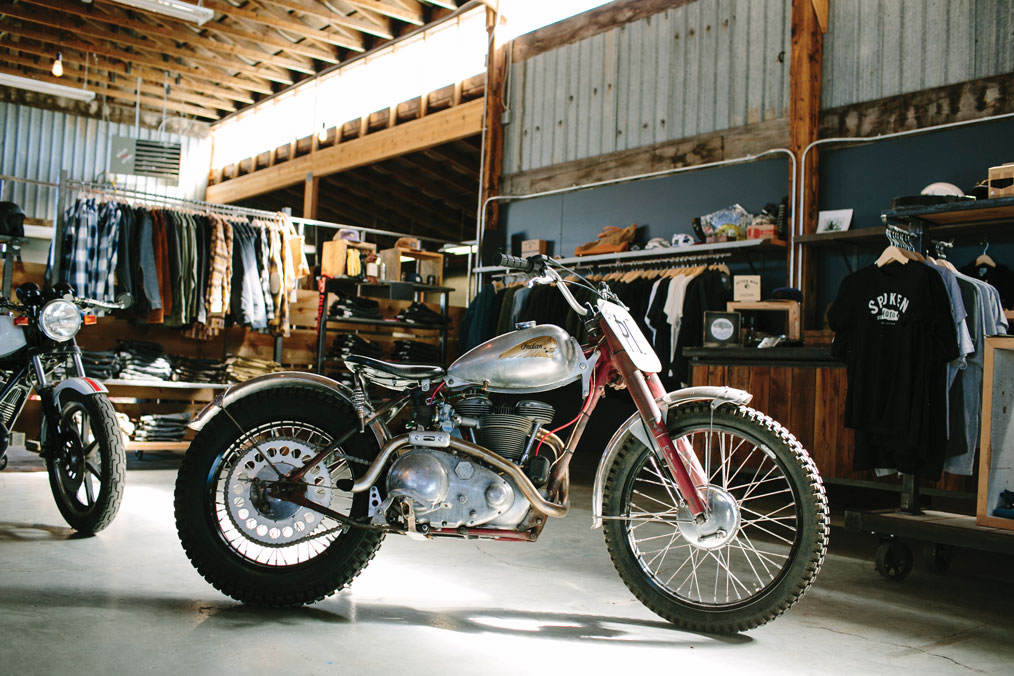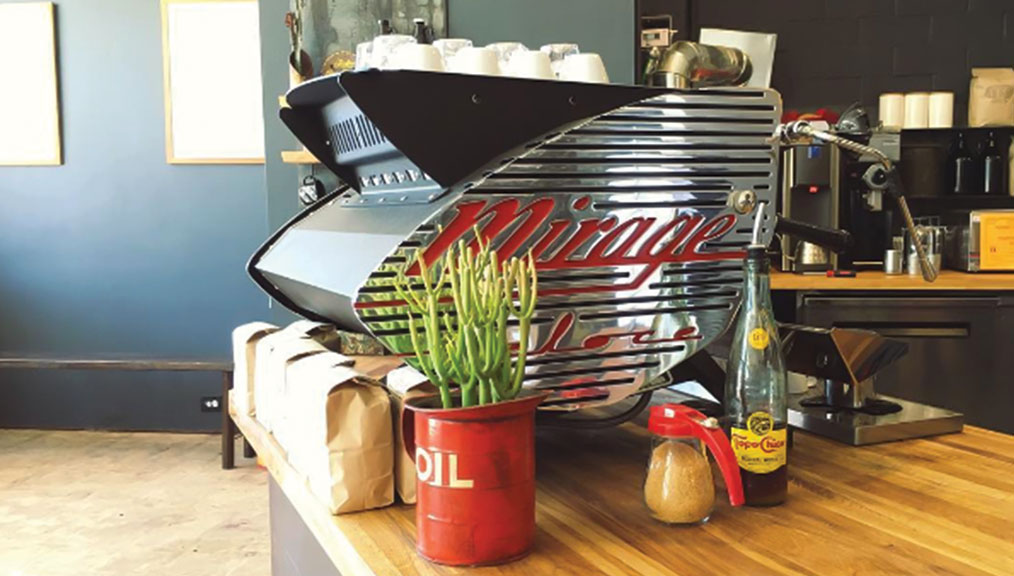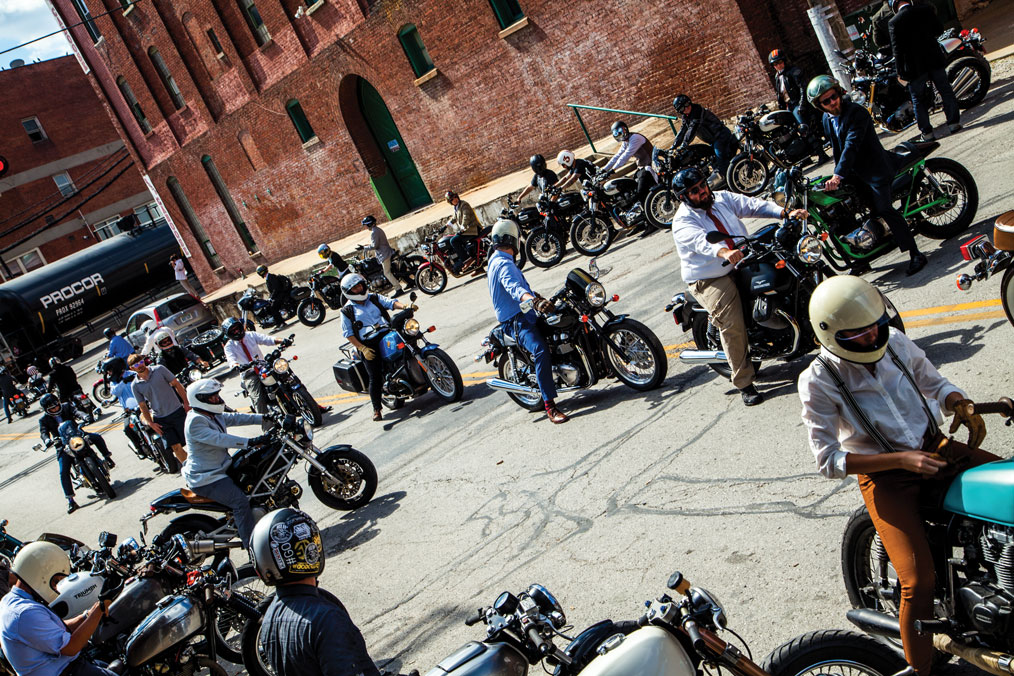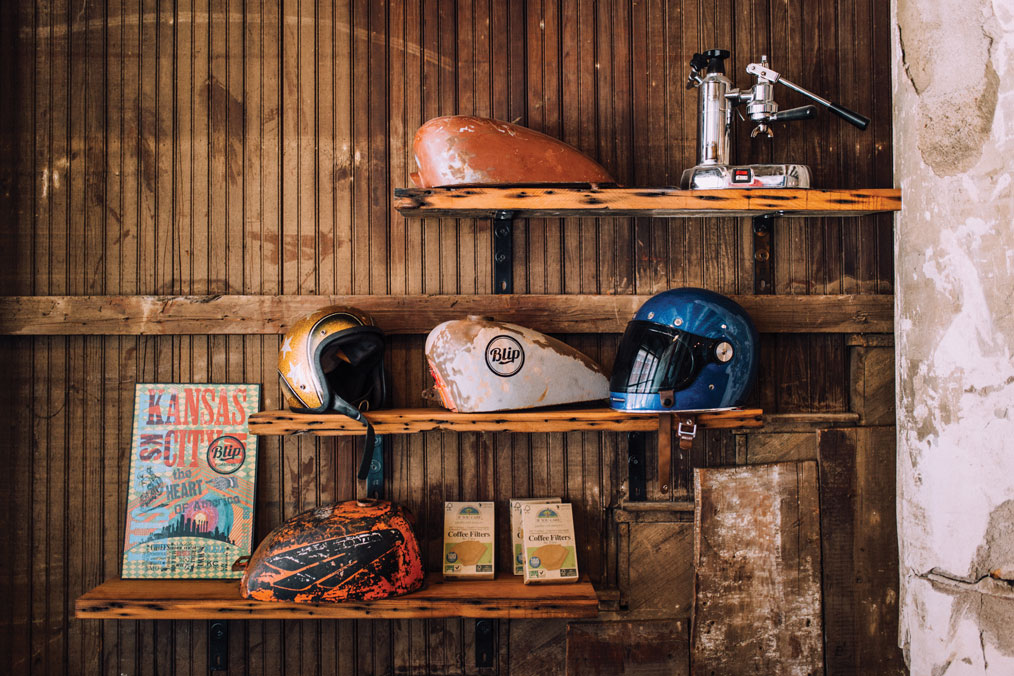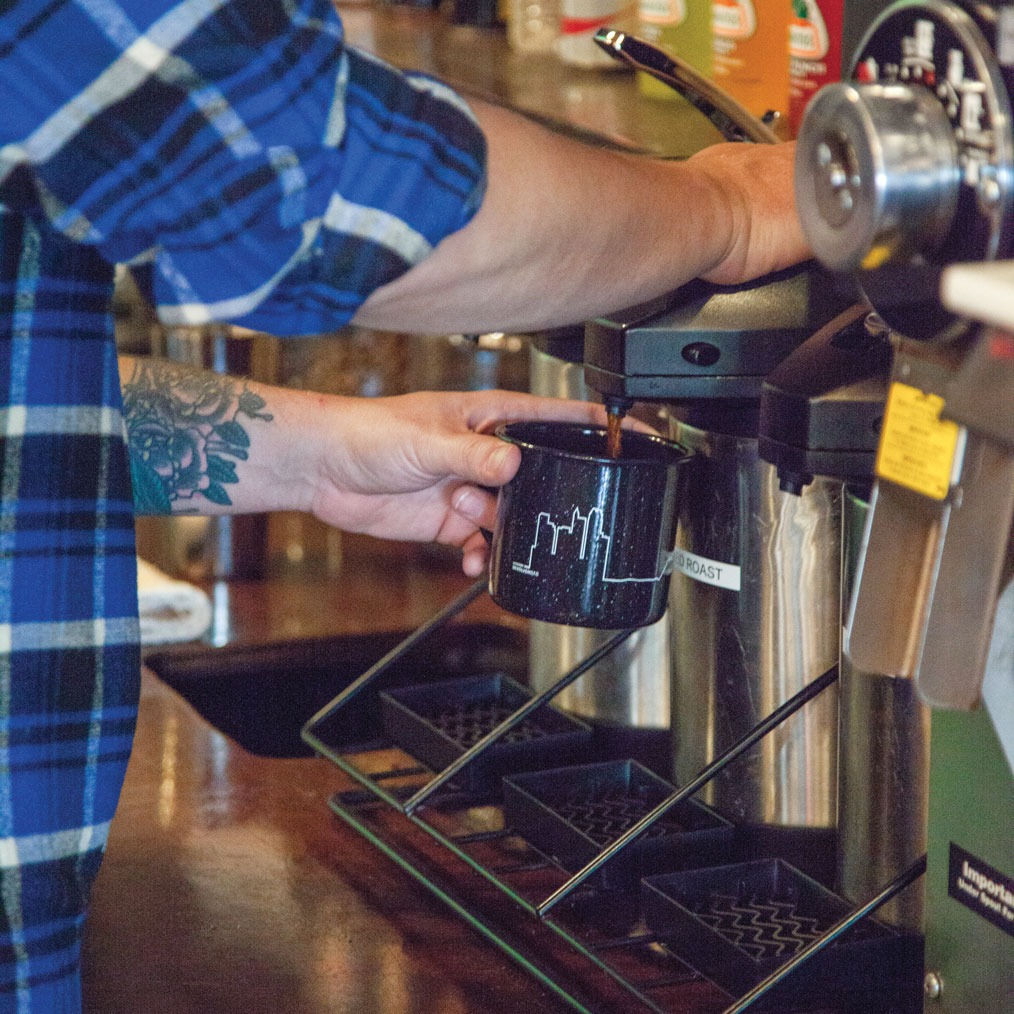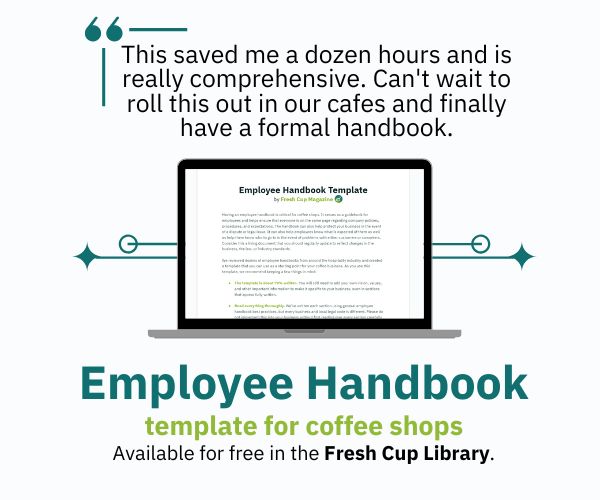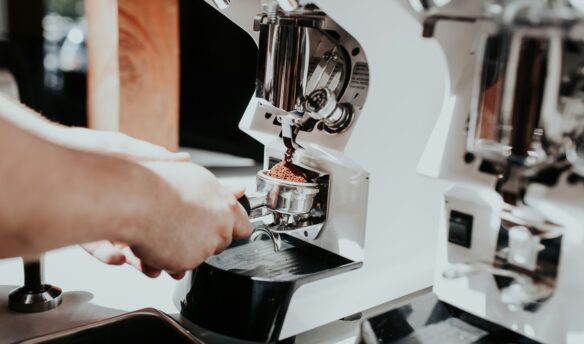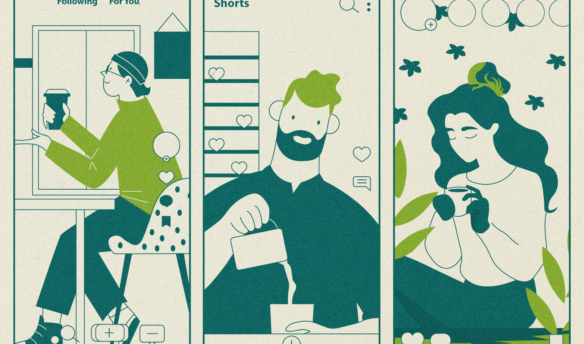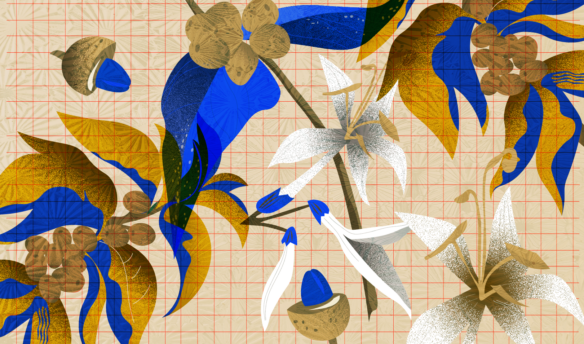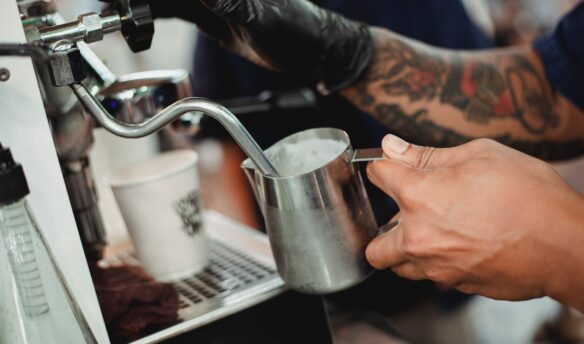A line of motorcycles outside Raleigh’s Devolve Moto. (Photo: courtesy of Devolve Moto.)
[T]here’s something strangely comforting about walking into a café, hearing the clunking of espresso grounds being settled into portafilters, the gurgles of milk steaming in pitchers—and the subtle aroma of gasoline wafting over the aroma of fresh-brewed filter coffee? It may sound like an odd pairing, but it’s a coupling that’s yielded positive results for cafés successfully curating the improbable partnership between motorcycles and coffee.
The motorcycle community has a long-rooted history with coffee. Café racers (lightweight, light-powered bikes) take their names from motorcycle enthusiasts who would take the bikes out on short, quick rides between cafés, a tradition dating back to the early parts of the twentieth century. Cafés are a desirable destination for riders who want to stay alert on the road, and coffee is a much more practical (and safe) alternative than hopping between bars.
Just like each bike is unique and has countless options for customization, each shot of espresso has the capacity to convey unique flavors and aroma, translated through brew methods, cultivation, and presentation.
Even with an established history of café racers, the jump to join riders to the specialty coffee community didn’t happen until recently. But the artistry behind specialty coffee has strong parallels with the mindset behind motorcycles—just like each bike is unique and has countless options for customization, each shot of espresso has the capacity to convey unique flavors and aroma, translated through brew methods, cultivation, and presentation. While you can pull a shot of espresso much more quickly than you can rebuild a bike, enthusiasts in both communities can find common ground in the dedicated study of crafts founded on mechanics, science, artistry, and people.
Combination motorcycle and coffee shops have cropped up in all corners of the world. Some shops have found a niche in retail, others as body shops and parts suppliers, while others focus primarily on coffee. Each balances the two cultures with aspects of business in a way that reflects the unique expertise and interests of the proprietors. More importantly, each café has curated a blend of motorcycles and coffee to reflect the needs of the surrounding community, providing a welcoming space for beginners and experts alike.
“For an everyday customer, to make the product more approachable you kind of have to take that seriousness away to make it more of something that everybody can enjoy,” says Jeremy Brooks, director of coffee at Flat Track Coffee in Austin, Texas. Having spaces not solely focused on motorcycle gear or pour-over bars reduces the intimidation factor of engaging with these cultures, welcoming new customers who might not have wandered in otherwise.
We’ll tour six motorcycle cafés around the country, seeing how each stop uniquely positions elements of coffee and bike culture through retail, repairs, refurbishing, and—perhaps most importantly—through community.
- Two Stroke Coffee
- See See Motor Coffee Co.
- Spoken Moto
- Flat Track Coffee
- Blip Coffee Roasters
- Devolve Moto
TWO STROKE COFFEE
Portland, Oregon
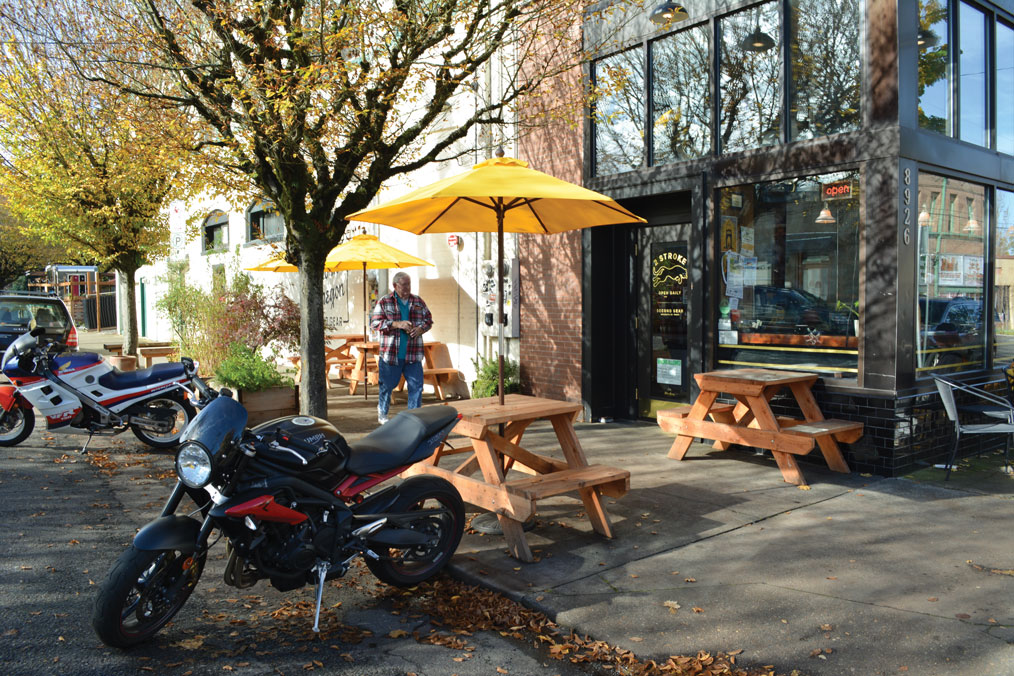
Our tour begins at Two Stroke Coffee, situated on a corner of the cozy St. John’s neighborhood of Portland, Oregon. The neighborhood is a few miles north of the city center, set along a bend in the Willamette River and the picturesque St. John’s Bridge. “Some of the best motorcycle-friendly roads are right over the St. John’s Bridge,” says co-owner Seth Ciferri. “We make a really good stopping point or landing point, or both.”
Ciferri says the location was a major motivation in the decision to open Two Stroke, which has become a rallying point for motorcycle enthusiasts. Ciferri and his partner, Stephanie Tommasello, run the coffee side of the shared business space.
“We both saw this as a creative outlet for us to make something that speaks to our personality and our aesthetic,” Ciferri says.
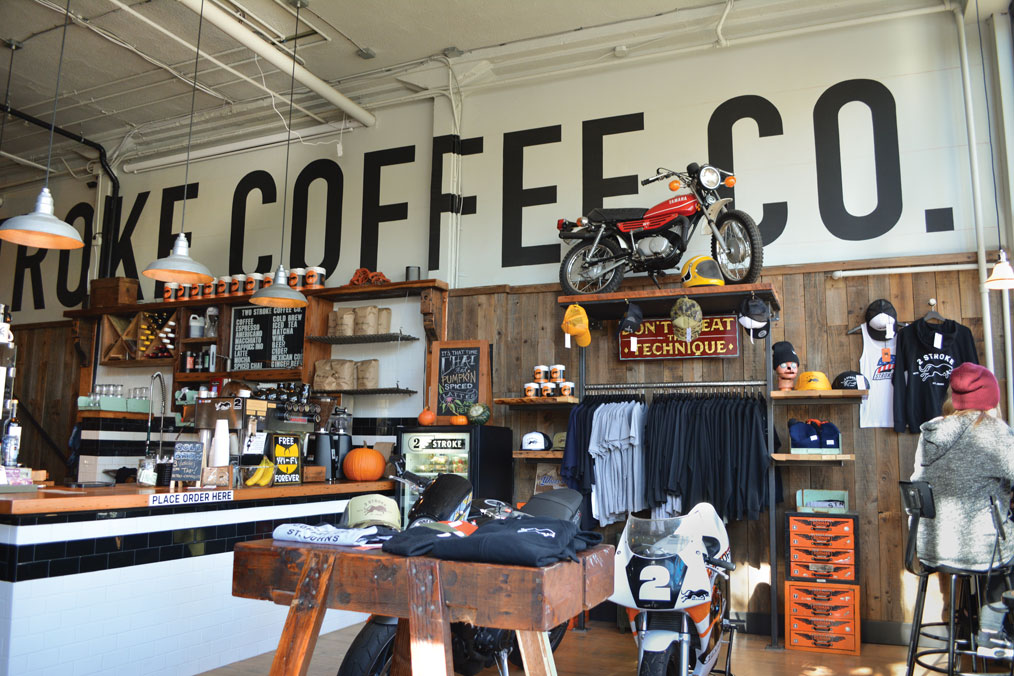
Second Gear runs out of the back half of the space, selling new and secondhand motorcycle gear, refurbished bikes, and new parts. Operating as two separate businesses allows Ciferri and Tommasello to focus on coffee, while Second Gear’s owners can devote their attention to the bike side.
Customers are drawn to the space by both businesses, increasing exposure for both the retail shop and the café.
“There are a lot of people who come here for the bikes and end up coming back for the coffee,” says Ciferri. “They like hanging out with all the other motorcycle people, and they like checking out everyone’s bikes, but at the same time, we make it a point to serve top-notch coffee.”
Tommasello says the reverse has been true of people who come in for coffee. Some customers have never touched a bike, and are now riding regularly. Having secondhand gear lowers the cost of entry for new riders, eliminating barriers to becoming a part of the motorcycle community.
SEE SEE MOTOR COFFEE CO.
Portland, Oregon
Just a short ride away, on a small lot in southeast Portland, See See is packed with gear, apparel, and swag. Nineties pop art covers the walls, along with polaroids and shelves of helmets. There’s no question you’re in a motorcycle shop, but the café aspect is also clear. A U-shaped bar dominates the main space of the café, providing ample space for customers to sit at the bar, or at one of a number of tables scattered throughout the shop. A La Marzocco Linea features a whimsical painting of a neon-colored wizard, a wink to the attitude See See takes when it comes to specialty coffee.
“It’s about not taking yourself too seriously,” says Tori George, who manages marketing and events for See See. She says that co-founders Thor Drake and George Kassapakis wanted See See to be a relaxed and inclusive environment. “We’ll take anyone,” George says. “If you’re on two wheels, we’re excited about it.”
She explains the decision to make the space an even split between café space and retail was very intentional—they didn’t want one element to dominate the other. They also wanted to the space to be inclusive.
See See has groups that meet at the space regularly, from Bikers for Christ to book clubs. They also host monthly art shows featuring local artists, motorcycle photographers, and brands carried in-store. Riding events bring riders together from around the globe; See See is well known for their involvement with events like Dirt Quake, the Distinguished Gentleman’s Ride, and the One Show.
“It’s not just a retail and coffee shop that’s selling stuff to people, we actually create experiences,” says George.
SPOKEN MOTO
Bend, Oregon
Heading east out of the city, through the mountain pass and into the drier climate of Bend, Oregon, Spoken Moto is an ideal destination for riders and coffee enthusiasts alike. The story of Spoken Moto is a fairly logical one in the eyes of partner and creative director Brent Van Auken: friends who were into refurbishing bikes came into a warehouse space, played with the idea of serving coffee, then posed the question, “What if we have this space and we’re able to serve the best coffee we possibly can?” Thus, Spoken Moto was born.
“The space is more like a gallery and an interactive workspace,” says Van Auken. “We’ll actually start a motorcycle while people are waiting to get their coffee. We enjoy that it’s a real shop that people can come and bring their bikes into, and where we’re working on our personal projects as well.”
Spoken Moto roasts coffee under the label Megaphone Coffee Co. Right now they roast enough to supply the shop, but they hope to expand to offer their coffee to wholesale partners. In addition to coffee, customers can also order a beer, or pick up food from one of four food carts in a neighboring lot.
Having the draw of food and beer—in addition to the motorcycle shop— brings in a crowd that might not be familiar with coffee. “We get to share what a cortado is with somebody for the first time and it’s like, ‘Woah!’ Now they come in every day and get one,” says Van Aucken.
FLAT TRACK COFFEE
Austin, Texas
The next leg of our journey is a long one, as we make the trek south to Austin, Texas. Here, Flat Track Coffee occupies a shared space with Cycleast, a bicycle repair and restoration shop.
“Any way you can collaborate with other business owners to accomplish the same goal and reduce costs is something Flat Track has always been interested in,” says Jeremy Brooks, Flat Track’s director of coffee.
Partnering with a bicycle shop was a natural choice for Flat Track co-founders Sterling Roberts and Matthew Bullock, who came up in the BMX circuit before making the switch to motorcycles.
Brooks says the unique combination of coffee and bikes draws in lots of new customers. “Most of them are coming in because they want to check out what it’s all about,” says Brooks. He values that Flat Track has a strong coffee program, but also prioritizes interests beyond the cup. “It’s something that’s not as standard as something you might see in cities in the United States where 100 percent of their focus is coffee.”
Flat Track hopes to be a catalyst for growth in both the motorcycle and specialty coffee communities, in part by acting as a bridge between the two. Brooks says part of their appeal is simply good customer service, as is their ability to cater to a niche group of customers for whom coffee and motorcycles fit into a particular lifestyle. Social media and retail offerings help cultivate the lifestyle aspect of Flat Track, while Brooks’ extensive experience in coffee raises the quality standards of the café.
“We’ve tapped into more of a niche group of people who are more interested in a particular kind of lifestyle, and coffee kind of pairs with that lifestyle, rather than it being the reverse, where coffee is the lifestyle and there’s nothing outside of that.”
BLIP COFFEE ROASTERS
Kansas City, Missouri
Winding our way north to Kansas City, we set our sights on Blip Coffee Roasters. Originally a wholesale roaster closed to the public, Blip built out a retail space after a fire wiped out their roastery in January.
“The fire totally shut us down,” says owner Ian Davis. “We were able to get some stuff out, but we lost all of our beans, packaging, any type of inventory we had. You name it, we lost it.”
In April, Blip re-opened as a retail shop in the West Bottoms neighborhood, an industrial area of Kansas City.
The decision to open a retail space was fueled in part by the community built through motorcycles during the time the wholesale operation was running. “I’d always park my motorcycle outside,” Davis says of the days he worked in the roastery. “You would just have curious people kind of see a sign and poke their heads in and see what’s going on. You’d see a few bikes show up and we’d make pour-overs for people who wanted to come in.”
Though Blip was by no means running a retail operation, the interest sparked the Blip Sunday Meet-up—more commonly known as Blip Sunday Church. Davis says a few people would meet at the roastery, drink some coffee and chat, then head out for a ride. What started with just a few people has evolved into weekly gatherings of sixty or seventy motorcycles converging on the shop.
Davis says the popularity of their new retail space is a reflection of today’s motorcycle riders. “It’s an amazingly diverse demographic,” he says. “You get lawyers, you get business people, you have motorcycle builders—basically any profession.” Davis says part of the beauty of the community is its ability to transcend wealth, race, gender, and any other divisions that might normally separate communities of people.
Blip’s location in an industrial area also means they see a lot of customers who are new to specialty coffee; they might be rolling in from driving a semi-truck or operating a BNSF railcar. To keep specialty coffee accessible to all customers, they keep a simple menu and always have a two-dollar cup of drip coffee as an option.
“When the specialty coffee consumer comes in and wants to have that conversation, I’m all about it,” Davis says, alluding to opportunities to educate customers about details on processing methods and cultivars. “But it’s just as important to realize that not everybody wants to.”
Davis says the community that’s been able to grow in Kansas City through motorcycles has been amazing, citing their roastery fire as a prime example, when he had a number of people rush to help him rescue equipment and bikes from the building.
“None of these people I knew prior to going into business and every single one of these people were running into this burning building with me trying to help me cover up the roaster, pull motorcycles out of the back,” Davis says. “Kind of a surreal experience to look back and realize I didn’t know these people sixteen months ago and here they are literally running into a burning building to help me out.”
DEVOLVE MOTO
Raleigh, North Carolina
We make our way to Raleigh, North Carolina, for our final stop, where Devolve Moto stands as one of the few motorcycle cafés east of the Mississippi. Co-founder Greig Hochreiter was working in TV and film when two incidents changed his trajectory and paved the way for Devolve. First, the state took away tax incentives for filming in North Carolina, dramatically reducing available work. Then Hochreiter was hit on his motorcycle by a drunk driver and hospitalized for about a week. During his time in the hospital, he discovered the website of Sydney’s Deist Ex Machina.
“I thought it was the coolest, best idea in the entire world,” says Hochreiter. “I thought, ‘if we had one of these in North Carolina, it would be killer—it would be the only place I’d be hanging out.’”
That was all it took for Hochreiter to start developing plans for Devolve. He took aspects of stores he liked and tried to tailor all the details to fit North Carolina. “The coffee part was just a no-brainer,” he says.
Hochreiter partnered with Torch Coffee and had the team at Devolve schooled on coffee, from sourcing to prep methods. Devolve seeks to build a community, which isn’t hard to do when you can appeal to an array of hobbies and provide great coffee. Apparel and gear offerings include wares for camping, motorcycling, and hiking.
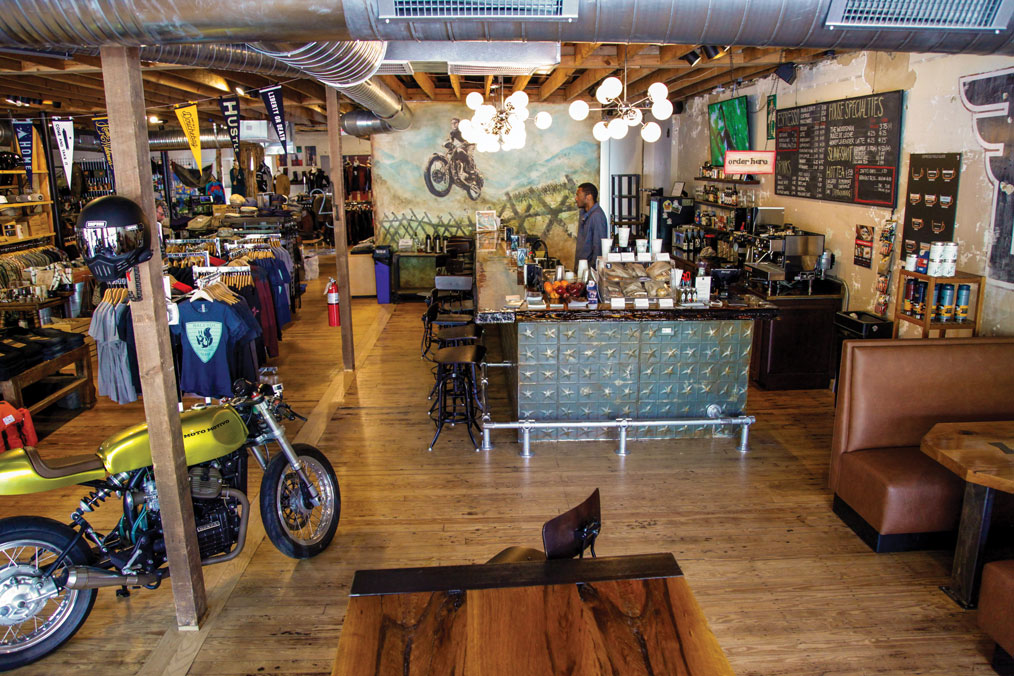
“The café allows you to have people come hang out at your store without feeling pressure to buy a high-ticket item,” Hochreiter says. The store is a great place for people to hang out and meet people with similar interests. “People are making new friends, hanging out, and seeing what bike’s gonna roll up next.”
—Ellie Bradley is Fresh Cup‘s editor.

